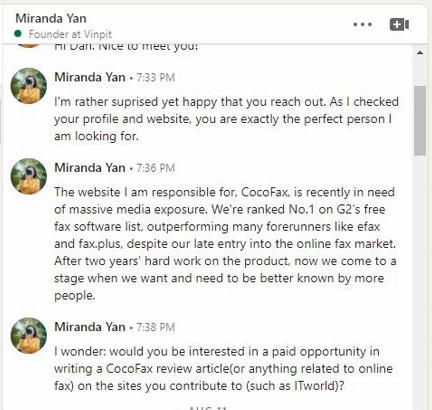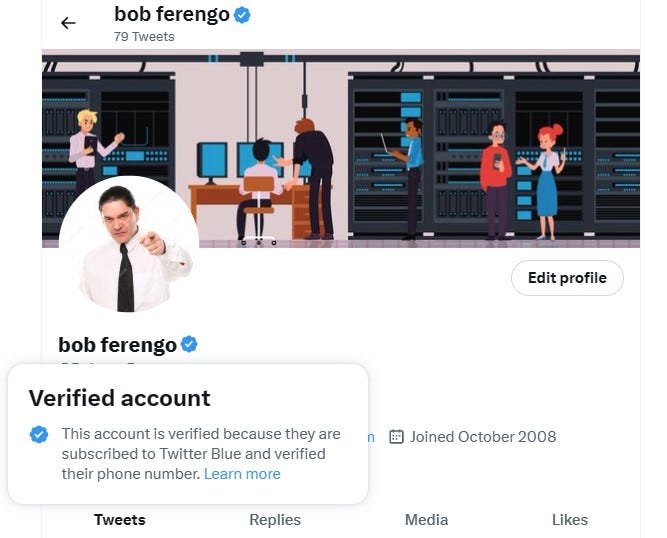Ghost staring at itself in the mirror. Is that creepy or what? Source: Midjourney.
Harriet Chan is quite the polymath.
Over the last two years, Harriet has offered up advice on a wide range of topics: trends in social media, the best high-end gaming monitors, the need for general liability insurance, environmentally friendly ways to dispose of used tires, the best messenger briefcases, how to seek treatment for addiction, whether your child has allergies, why watches have jewels, the best energy gels for dancers, how to spot if your boss is a narcissist, the secrets of work-life balance... and on, and on.
She's been quoted thousands of times, mostly on websites you've never heard of, but occasionally in mainstream publications like Forbes, the New York Post, Self, and Yahoo.
In other words, Harriet really appears to know her stuff.
There's only one problem. Harriet Chan is not real. She's the creation of some black hat Search Engine Optimization firm half a world away. She exists solely to drive traffic to one of the many people search engines on the Internet, which I will not name or link to here.
The photo “Harriet” uses on her (very generic) LinkedIn and Twitter accounts is actually of an award-winning divorce attorney in Singapore named Dorothy Tan.
They laugh alike, they talk alike, at times they even walk alike... Sorry, had a brief Patty Duke Show flashback there.
You can bet any story that contains a quote (and usually a photo) from Harriet Chan is probably also full of other people who do not exist in corporeal form. I've discovered dozens of similar fakes; there are probably thousands.
First we had fake news. Now we have fake sources.
Nobody loves you like Google loves you
Here's how it works. Journalists who are seeking sources for a story post their queries on a site like Help a Reporter Out (HARO) or Qwoted. (This is an enormous time saver, and services I have used a ton myself in the past.) People who have material to contribute to the story can respond via email.
Often, the journalist asks a question, and sources respond with a few sentences or paragraphs that address that question. Journalist says, "thank you very much," and copies and pastes it into their story, along with a link to that fake person's real website.
The link is the key; the more links you have on the Interwebs pointing back to your site, the more Google loves you. And everyone wants to be loved by Google. So people, mostly living in eastern Asia, are paid pennies per word to gin up answers to these questions, in the hopes they'll fool some sucker into quoting them. [1] They are called “HARO writers.” It’s an actual job.
Nobody bothers to check whether this person exists, beyond their not very convincing Twitter and LinkedIn accounts. Worse, nobody asks how a person who works for a people search engine happens to know so much about recycling tires, messenger bags, or narcissism. [2]
It gets worse. In some cases, journalists are offered payment by these bottom feeders to write stories linking back to their sites. This would constitute a serious ethical breach at any respectable publication, and would result in that writer never being hired again.
This is not just theoretical. One of them approached me on LinkedIn and tried to pay me to place a story in one of my clients "reviewing" their shitty little electronic fax website (a sister site to the aforementioned people search engine).
I would bet folding money that "Miranda Yan" [3] and "Harriet Chan" are the same person, likely just two of several other noms de merde used by the same individual.
Harriet was most active in spring of 2021, when I first ran across her. I suspect she’s been retired (or possibly the HARO folks eventually figured out she was fake), and new faux humans have taken her place.
Am I blue?
As I've written previously, fakes are one of the biggest problems on the Internet because they allow people to act without accountability.
On that note, I applied for and received a blue check for one of my alter ego Twitter accounts. [4] I wanted to see what steps Elon's Twitter took to verify my identity and if it was possible to create a "verified" account for a non-verifiable nonhuman. It took a few days to get it approved, but it worked.
I did have to submit an actual phone number from a real carrier (it rejected my Google Voice number) and of course provide a real credit card (PayPal or other digital payment systems were not an option) with my actual name and billing info. [5]
That means if I used said fake account to do something potentially illegal — share links to the nuclear launch codes or say something mean about Scientology that gets me sued — Twitter could be forced to reveal my legal identity. Otherwise, I'm free to be an unfettered asshole to one and all, risking nothing.
So much for ridding Twitter of bots and fakes.
The good news? Now that I've got my blue check, I can log onto HARO and start serving up faux answers to lazy reporters. If it's good enough for Harriet, it's certainly good enough for Bob.
Is reasonable advice from an entirely fictional person still worth listening to? Post your thoughts below.
[1] And now HARO writers are using ChatGPT to generate their answers, and AI image generators for their photos. Ain't technology grand?
[2] Are these reporters incredibly lazy? You bet. On the other hand, given what most of these websites pay (you'd do better flippin' burgers) I can sympathize with reporters who are desperate to turn as many stories around as quickly as they can.
[3] Miranda has also been quoted thousands of times on the webbernets. Her image is a stock photo.
[4] For years I have maintained fake accounts on all the major social networks, mostly so I could test stuff out without having to put my own account data at risk. So yes, I too am faking it for fun and profit.
[5] I also had to give Elon $8 of my hard-earned dosh. Just another sacrifice I make for you, dear reader.








Fraud and negligence. Very insightful piece about the real ghosts people don't know don't exist!
A race to the dystopian bottom...fun.
Seriously though -- I would love to read about actual solutions for all this online skulduggery. Are there recommendations/ideas out there, or are there any people, groups and/or institutions working on verification in a substantive way?